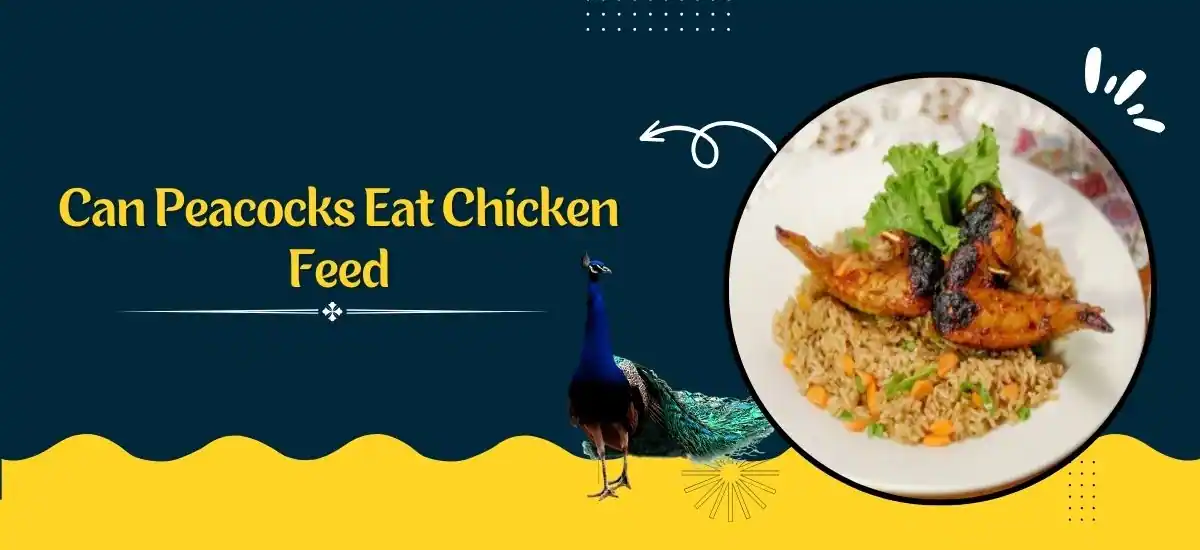Peacocks, often hailed as the epitome of avian beauty, boast a vibrant plumage that has captivated human admiration for centuries. Beyond their visual splendor, these birds have unique dietary habits that play a pivotal role in their overall health and the brilliance of their feathers.
Originating from the lush forests of South Asia and Southeast Asia, their natural diet is a diverse mix of plant-based items and small creatures. As omnivores, peacocks have a varied diet ranging from grains, fruits, and vegetables to insects and other small organisms.
Understanding their dietary preferences and needs is crucial for anyone who wishes to rear these magnificent birds, ensuring they thrive and display their iconic fan of feathers in all its glory. This article delves into the intricacies of the peacock’s diet, shedding light on what truly nourishes them.
The Basic Diet of Peacocks
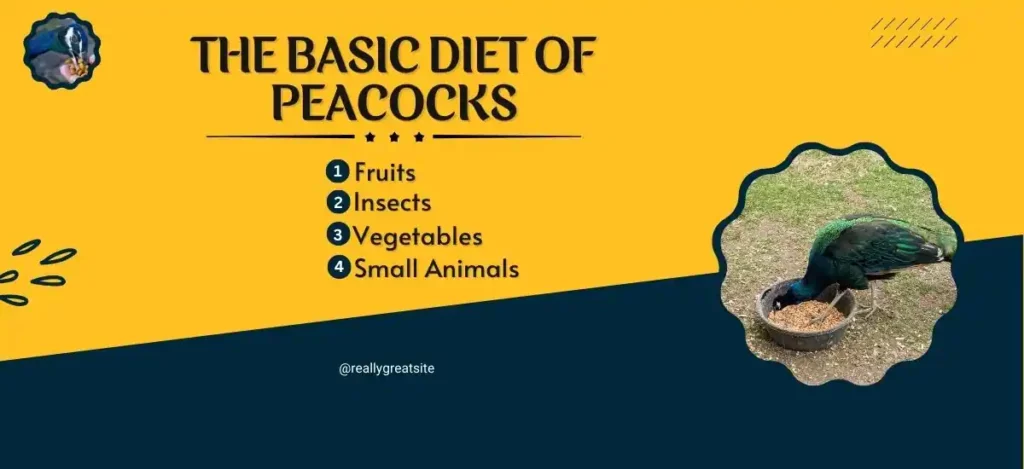
Diving deeper into the dietary intricacies of peacocks, one quickly realizes the vastness of their palate. As creatures that have roamed the diverse terrains of South and Southeast Asia, their diet is a reflection of the rich biodiversity of these regions.
1. Insects: A significant portion of a peacock’s diet is made up of insects. They are adept at foraging for beetles, ants, termites, and other small insects, which provide them with essential proteins. Their keen eyesight and swift movements make them efficient insect hunters, ensuring they get the nutrients vital for their growth and feather health.
2. Fruits: Peacocks have a penchant for fruits. Berries, figs, and even fallen fruits like mangoes and bananas are among their favorites. These fruits not only offer them a sweet treat but also provide essential vitamins and minerals.
3. Vegetables: Their diet is not limited to just fruits. Peacocks are often seen nibbling on various vegetables and greens. Leafy vegetables, sprouts, and even root vegetables like carrots form a part of their diet, offering them a balanced intake of fiber and other nutrients.
4. Small Animals: While it might come as a surprise to many, peacocks do consume small animals. Their omnivorous nature means they occasionally feed on amphibians, small reptiles, and rodents. This not only diversifies their diet but also ensures they get a rounded intake of proteins and fats.
Understanding the basic diet of peacocks is fundamental to ensuring their well-being, especially if they are being reared in captivity. Offering them a diet that mirrors their natural intake is key to seeing them flourish and display their radiant plumage.
Can Peacocks Eat Chicken Feed?
When it comes to feeding peacocks, a common question arises: Can they eat chicken feed? At a glance, peacocks and chickens might seem similar, but they have distinct dietary needs. While chicken feed isn’t inherently harmful to peacocks, it doesn’t offer the optimal nutrition that peacocks require.
Relying solely on chicken feed can deprive peacocks of essential nutrients, potentially affecting their health and the vibrancy of their feathers.
Commercial Feeds for Peacocks
For those rearing peacocks, commercial feeds designed specifically for them are available. These feeds are formulated keeping in mind the unique nutritional requirements of peacocks. Pheasant and game bird feeds, in particular, are recommended as they closely match the protein and nutrient levels that peacocks need.
Grains Suitable for Peacocks
Grains have always been a staple in the diet of many birds, and peacocks are no exception. These grains not only provide the essential energy these birds need but also play a crucial role in their overall health and well-being. Let’s delve deeper into the grains that are particularly beneficial for peacocks:
| Grain | Overview | Key Nutritional Benefits | Additional Health Benefits |
| Millet | 1. Small, round grain. 2. Comes in white, gray, and yellow. 3. Favorite among many birds due to size and taste. | 1.Packed with magnesium, phosphorus, and B vitamins. 2. Good source of antioxidants. | 1.High fiber content aids in digestion. 2. Promotes a healthy gut in peacocks. |
| Oats | 1. Versatile grain known for health benefits in human diets. 2. Beneficial for birds, including peacocks. | 1. Rich in essential fatty acids crucial for feather health. 2. Contains a good amount of protein. | 1. Beta-glucans reduce cholesterol levels. 2. Promotes heart health in birds. |
| Wheat | 1. One of the most common grains globally. 2. Significant part of the diet for various birds. | 1. Provides manganese, selenium, and phosphorus. 2. Good source of dietary fiber. | 1. High phosphorus content maintains bone health. 2.Ensures strong and healthy bones in peacocks. |
The Debate: Chicken Feed for Peacocks
The primary reason chicken feed isn’t recommended for peacocks is the difference in protein requirements. Chickens and peacocks, despite both being birds, have evolved with different dietary needs. While chicken feed might suffice for a short period, relying on it long-term can lead to nutritional deficiencies in peacocks.
Foods to Avoid for Peacocks
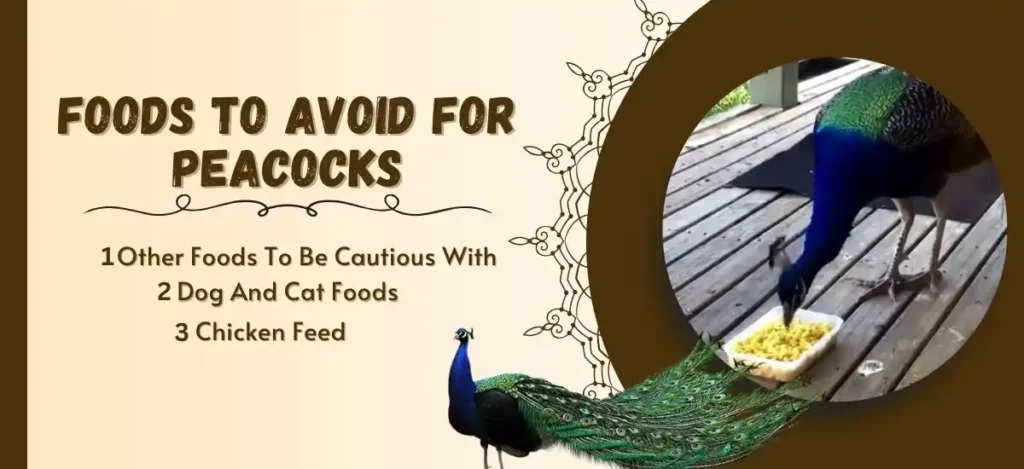
While peacocks have a diverse diet, there are certain foods that can be detrimental to their health. It’s essential to be aware of these to ensure the well-being of these magnificent birds.
Dog and Cat Foods
- Overview: Dog and cat foods are formulated specifically for carnivorous pets. They contain a mix of proteins, fats, and other nutrients tailored to the dietary needs of these animals.
- Why They’re Unsuitable: The protein sources in these pet foods, often derived from meats, are not ideal for peacocks. These foods also contain additives and certain nutrients that might not be suitable for avian consumption.
- Potential Risks: Regular consumption can lead to nutritional imbalances in peacocks. There’s also the risk of introducing harmful substances or pathogens that peacocks are not naturally equipped to handle.
Chicken Feed
- Overview: Chicken feed is designed to meet the dietary needs of chickens, which differ from those of peacocks.
- Nutritional Mismatch: Chickens and peacocks have different nutritional requirements. For instance, peacocks need a higher protein content to maintain their vibrant plumage. Chicken feed might not provide this optimal protein level.
- Health Concerns: Regularly feeding peacocks with chicken feed can lead to deficiencies or excesses in certain nutrients. Over time, this can result in health issues, ranging from dull feathers to more severe metabolic disturbances.
Other Foods to Be Cautious With
- Processed Foods: Foods high in salt, sugar, or artificial additives should be avoided. These can be harmful to peacocks and lead to health issues over time.
- Certain Fruits and Vegetables: While many fruits and vegetables are beneficial, some, like avocados, can be toxic to birds. It’s essential to be aware of these and keep them out of a peacock’s diet.
In conclusion, while peacocks are not overly fussy eaters, care should be taken to ensure they are not fed foods that can harm them. A balanced diet, free from unsuitable foods, will ensure that peacocks remain healthy and continue to display their stunning plumage.
Can Peacocks Eat Bread?
Occasionally, peacocks might be seen nibbling on bread. While it’s not toxic, bread doesn’t offer much nutritional value. It’s best given as a rare treat rather than a regular food item.
Peacocks and Sunflower Seeds
Sunflower seeds are a nutritional powerhouse for peacocks. Rich in fats and proteins, they can be a beneficial addition to their diet, supporting feather growth and overall health.
Fruits Peacocks Love
Peacocks enjoy a variety of fruits. Apples, berries, and grapes are particularly loved. However, it’s essential to avoid fruits like avocados, which can be toxic to them.
Importance of Fresh Water for Peacocks
Water plays a pivotal role in the health and well-being of all living organisms, and peacocks are no exception. The significance of fresh water for these majestic birds cannot be overstated. Here’s a detailed breakdown of the importance of freshwater for peacocks:
Essential for Digestion
- Detail: Just like in humans, water aids in the digestion process in peacocks. It helps break down food, making nutrients more accessible for absorption.
- Impact: Without adequate water, peacocks might face digestive issues, leading to malnutrition or other related health problems.
Temperature Regulation
- Detail: Peacocks, being active birds, generate body heat. Water helps regulate their body temperature, especially during hot days, ensuring they don’t overheat.
- Impact: In the absence of sufficient water, peacocks can suffer from heat stress, which can be fatal if not addressed promptly.
Detoxification
- Detail: Water assists in flushing out toxins and waste products from the peacock’s body through urination and excretion.
- Impact: A constant supply of fresh water ensures that harmful substances don’t accumulate in the bird’s body, preventing potential health complications.
Metabolic Processes
- Detail: Many of the bird’s metabolic processes, including energy production, rely on water. It acts as a solvent for various biochemical reactions.
- Impact: Insufficient water can hamper these vital processes, leading to reduced energy levels and overall vitality.
Joint Lubrication
- Detail: Water aids in lubricating the joints of peacocks, facilitating smooth movement.
- Impact: Adequate hydration ensures that peacocks can move freely without joint discomfort or stiffness.
Skin and Feather Health
- Detail: Proper hydration ensures that the skin of peacocks remains healthy and their feathers retain their luster.
- Impact: Dehydrated peacocks might exhibit dull feathers, which can affect their overall appearance and well-being.
Prevention of Dehydration
- Detail: Especially during hot days, peacocks can lose a significant amount of water through respiration and evaporation. They need to replenish this loss to prevent dehydration.
- Impact: Dehydration can lead to a host of health issues, from reduced appetite to severe metabolic disturbances.
In conclusion, fresh water is not just a basic need but a lifeline for peacocks. Ensuring they have constant access to clean water is paramount for their health, vitality, and overall well-being.
Read More: Do Ducks Mate For Life? Unveiling The Fascinating Bonding Habits
Peacocks and Peanuts
While peanuts can be given as treats, they should be unsalted and in moderation. They offer proteins and fats but should not replace their primary diet.
Daily Food Intake of Peacocks
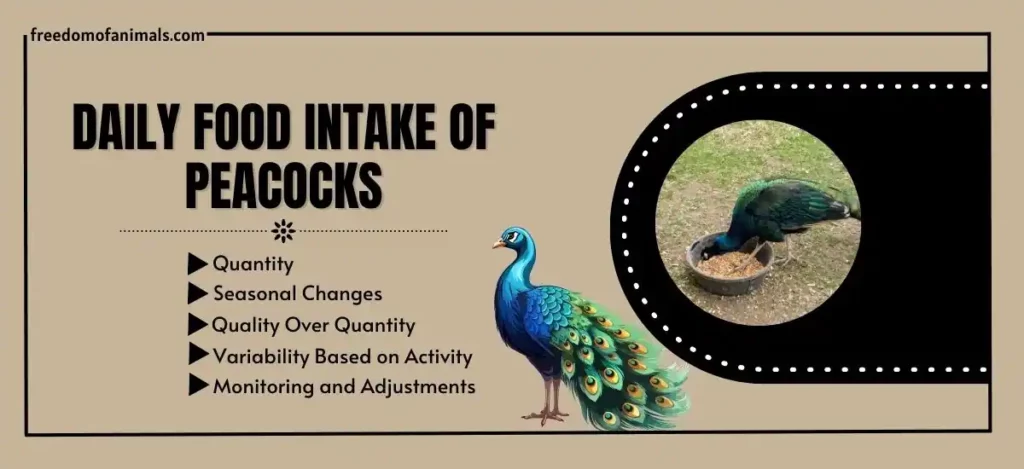
The dietary habits of peacocks, like many birds, are influenced by a combination of their natural instincts, environmental factors, and specific physiological needs. Understanding the daily food intake of an adult peacock is essential for those who wish to rear these birds, ensuring they receive adequate nutrition. Here’s a detailed exploration of their daily food consumption:
Quantity
- Detail: On average, an adult peacock consumes between a quarter to a half-pound of food daily. This might seem like a small amount, but given the size of the bird and the nutrient density of their diet, it’s sufficient to meet their energy and nutritional demands.
Variability Based on Activity
- Detail: Peacocks that are more active, perhaps due to a larger roaming area or engaging in frequent displays of their plumage, will naturally require more food. Their energy expenditure is higher, and thus, their food intake needs to compensate for this.
- Impact: In environments where peacocks are more active, caregivers should monitor their food consumption closely and adjust quantities as needed.
Seasonal Changes
- Detail: The amount of food a peacock consumes can also vary with the seasons. During warmer months, their metabolic rate might increase, leading to a higher food intake. Conversely, in colder months, especially if they are less active, their food consumption might decrease slightly.
- Impact: It’s essential to be attuned to these seasonal shifts and adjust the food offerings accordingly. For instance, during mating season, when males frequently display their feathers, they might require additional nutrition.
Quality Over Quantity
- Detail: While the quantity of food is essential, the quality is equally crucial. Peacocks need a balanced diet comprising grains, fruits, vegetables, and protein sources. Simply providing them with a large quantity of a single food type won’t meet their nutritional needs.
- Impact: Caregivers should focus on offering a diverse and balanced diet, ensuring peacocks receive all the essential nutrients.
Monitoring and Adjustments
- Detail: Regularly monitoring the weight and health of peacocks can provide insights into whether their dietary needs are being met. If a peacock is losing weight or showing signs of malnutrition, adjustments to their diet might be necessary.
- Impact: Regular health check-ups and being observant of any changes in eating habits can ensure that peacocks remain healthy and vibrant.
In summary, while there’s a general guideline for the daily food intake of peacocks, individual needs can vary. It’s essential to be attentive, and flexible, and prioritize the quality and balance of their diet to ensure their well-being.
Guide: A Step-By-Step Guide On How To Use A Duck Call Like A Pro
Factors Affecting Peacock’s Diet
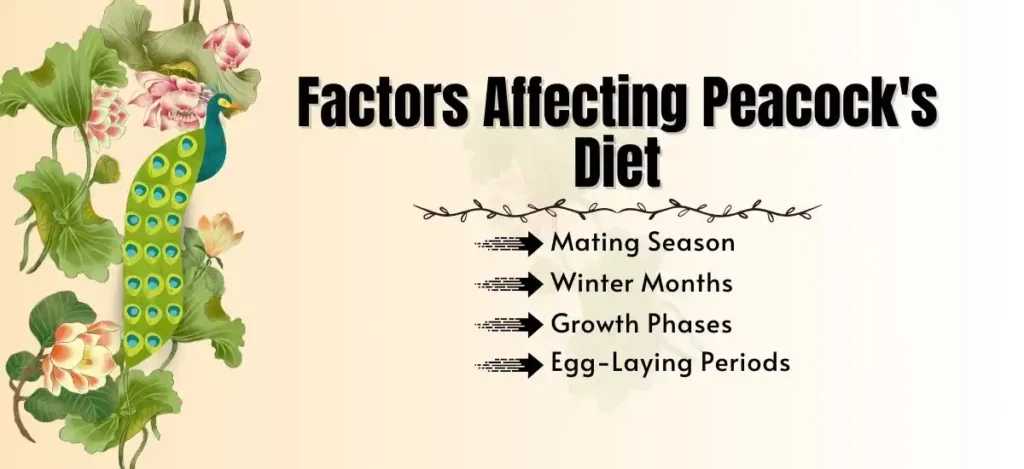
1. Mating Season: During this period, male peacocks frequently display their feathers to attract mates, leading to increased energy expenditure and, consequently, higher food intake.
2. Winter Months: Colder temperatures can slow down metabolism, potentially reducing the amount of food peacocks consume. However, they might also need more energy to maintain body heat.
3. Growth Phases: Young peacocks or those still growing will have different dietary needs compared to fully grown adults. They might require more protein and nutrients to support their growth.
4. Egg-Laying Periods: Female peacocks, when laying eggs, have increased nutritional needs, especially calcium, to support egg production. By understanding these factors, caregivers can adjust the diet of peacocks accordingly to ensure optimal health and well-being.
Frequently Asked Questions
Q1. How Much Food Does An Adult Peacock Typically Consume Daily?
Ans: An adult peacock usually eats between a quarter to a half-pound of food daily, though this can vary based on activity and season.
Q2. Do Peacocks Drink A Lot Of Water?
Ans: Yes, fresh water is vital for peacocks, especially during hot days, to stay hydrated and maintain their health.
Q3. How Does The Mating Season Affect A Peacock’s Diet?
Ans: During the mating season, male peacocks might consume more food due to increased energy expenditure from displaying their feathers.
Q4. Do Peacocks Need A Different Diet During Their Growth Phase?
Ans: Yes, young peacocks or those in their growth phase might require a diet richer in protein and other nutrients to support their development.
Q5. How Does The Egg-Laying Period Affect The Diet Of Female Peacocks?
Ans: Female peacocks need increased nutrients, especially calcium, during the egg-laying period to support egg production.
Conclusion
Peacocks, with their vibrant plumage and majestic presence, are a marvel of nature. Ensuring their optimal health and well-being requires a deep understanding of their dietary needs. From the grains they prefer to the foods they should avoid, every aspect of their diet plays a crucial role in their overall health.
Factors like mating season, growth phases, and environmental changes further influence their nutritional requirements. By being attentive to these needs and providing a balanced, nutritious diet, we can ensure that these magnificent birds thrive and continue to grace our surroundings with their beauty.
Whether you’re a peacock enthusiast, a farmer, or someone curious about these birds, always remember that a well-fed peacock is a happy and healthy peacock.
Related Post:
